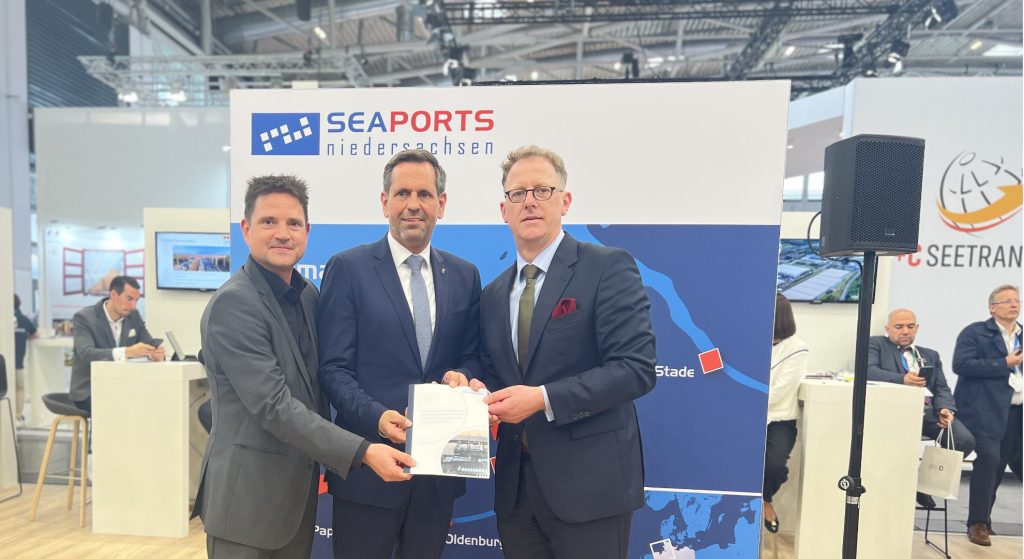Potential analysis reveals space requirements - urgent investments needed
Emden/Oldenburg/Stade. For a climate-neutral Germany, electricity generation from renewable energies is essential. In the course of this, the expansion of wind energy on land and at sea is being driven forward in Germany. The installed capacity of wind energy on land is already to be approximately doubled by 2030 compared to 2022 and almost quadrupled at sea. These ambitious expansion targets of the German government, but also of other EU countries, represent a major challenge for production, installation, operation and logistics.
The Arbeitsgemeinschaft Niedersächsische Seehäfen, in cooperation with Niedersachsen Ports, has therefore commissioned a study to examine the ports' compliance with regard to wind energy expansion so that they can make the best possible contribution to the success of the German energy turnaround in the coming years. The study is to be presented at the National Maritime Conference, which will be held in Bremen at the beginning of September, and will find its way into the federal government's National Ports Strategy. The initial results of the analysis were presented by Michael de Reese, spokesman for the Arbeitsgemeinschaft Niedersächsische Seehäfen, and Dr. Dennis Kruse, Managing Director of Deutsche WindGuard GmbH, which was commissioned to prepare the study, at this year's "transport logistic" trade fair in Munich in the presence of Niedersachsens Economics Minister Olaf Lies.
"The seaports of Niedersachsen are ready," says Michael de Reese, spokesman for the Arbeitsgemeinschaft Niedersächsische Seehäfen. "The area potential is there. If the expansion targets in wind energy are to be achieved by 2030, the political investment decisions must be made now so that transhipment areas can also be developed in the short term." One should not rely on additional port capacities at European neighbors such as in the Netherlands or Denmark, de Reese continued. He said that these are likely to be at capacity due to their own national expansion targets, which are similarly ambitious to those in Germany.
"We expect that the wind energy industry will have a significantly higher demand for port space in the future, both in the short term and in the long term, in order to meet the expansion targets onshore and offshore and to maintain the existing portfolio," says study leader Dr. Dennis Kruse, Managing Director of Deutsche WindGuard. Among the factors are high annual construction rates onshore and offshore as early as 2025, growing dimensions of wind turbine components or the increasing dismantling of older wind turbines, first onshore and then offshore, Kruse adds. Since logistics as a whole must not become a bottleneck in the value chain for achieving the expansion targets, quays as well as port access routes and hinterland connections are also the subject of the study.
Niedersachsens Minister of Economic Affairs Olaf Lies: "Already today, our ports are an important part of the value chains of the wind energy industry, among other things as a main transhipment base, production port, storage area or service port. In addition to the opportunities for new settlements, this is an important aspect, because we are not only a transit country, we will benefit significantly from the transformation of our economy and energy supply to climate neutrality through new value creation, particularly on our coast.
And a look at the national and European wind energy expansion targets shows: The importance of Niedersachsens ports will once again increase significantly. From 2025, we expect an annual plant expansion of around 2,000 onshore and offshore wind turbines - about three times as much as today. The study presented today includes the good news that our ports have the potential to be an important part of this dynamic process."
You can download the potential analysis and the press release of the Arbeitsgemeinschaft Niedersächsische Seehäfen. www.seehafen-niedersachsen.de
Handover of the study at transport logistic in Munich
Copyright: Seaports of Niedersachsen: from left to right: Dr. Dennis Kruse (Managing Director Deutsche WindGuard GmbH), Olaf Lies (Niedersächsischer Minister of Economics, Transport, Building and Digitalization) and Michael de Reese (Spokesman of the Arbeitsgemeinschaft Niedersächsischer Seehäfen).


